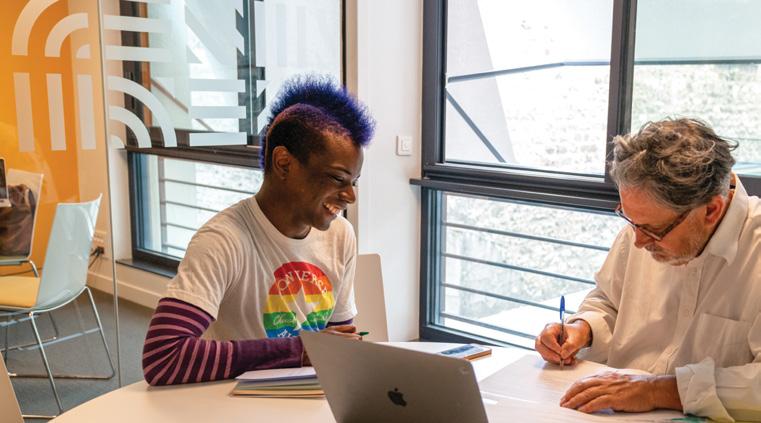
13 minute read
A MEANINGFUL CAREER
Darcee Caron G’13 | FRANCE
Darcee Caron G’13 came to Paris the long way around – in doing so she followed a broad career path fit for any global explorer. Now, as Director for Experiential Learning at AUP, she knows just how valuable AUP’s global liberal arts education is to students seeking a meaningful career.
At The American University of Paris, we strive to provide a career-enabling education. That doesn’t just mean any old career; it means a career that allows graduates to reach their full potential, to have a positive impact on the world stage and, ultimately, to feel fulfilled. We often say how proud we are of the diversity of our student body – over 100 nationalities are represented on our campus – but this diversity extends beyond demographics into the professional fields with which our alumni engage. We set up our graduates to find work that harnesses their specific skill sets, motivates them to make a difference in their communities and allows them to live up to their greatest ambitions. Although there is a wide range of careers on offer to our global explorers, one important factor ties these opportunities together: an AUP graduate, whatever his or her major, winds up in a meaningful career.
THE LONG ROAD TO PARIS
It took me almost ten years to make it to AUP. I first heard about the University in 2004, during my junior year of high school. That summer, I had embarked upon a whirlwind European tour covering four cities in nine days. The trip included a two-day stay in Paris – two days was all it took. I returned to my small town in northwest Florida with Paris engraved in the forefront of my mind. I had developed a plan for life after high school: I was going to learn French in six months, then apply to a French university. Thankfully, my International Baccalaureate Program Director received some promotional materials from AUP that fall. Mrs. Kane knew I was intent on getting to Paris, and she shared the news that I wouldn’t have to speak French fluently to make it happen.
In 2005 I applied to AUP and was accepted. Ultimately, I decided to stay closer to home; I attended Eckerd College in Saint Petersburg, Florida, where I read anthropology and philosophy. Though I did not attend AUP for undergraduate, I still adopted a global explorer’s mind-set. Part of what makes AUP special is the breadth of study that its global liberal arts curriculum offers. Having a broad education allows students not only to succeed academically, but also to be interesting, well-rounded individuals. It’s one of the reasons why IB students like me get on so well here, whether they apply for a bachelor’s or a master’s: they will have likely encountered such thinking before.

Darcee Caron speaking to students at the 2019 GPS awards
After my undergraduate degree, I studied law for a year, then traditional Chinese medicine. By this time, it was 2012, and though I hadn’t yet found the perfect opportunity, I certainly had broad experience. I remembered that, back in 2004, AUP had been talking about offering master’s degrees. One internet search later and, to my pleasure, I discovered a suite of AUP master’s programs now up and running. I soon arrived in Paris to complete the MA in Public Policy and International Law. My one year in France has since become seven (and counting). I’ve recovered my Luxembourgish nationality; met the man who has since become my husband (and given birth to Augustine, our first daughter); worked as a tour guide, a lobbyist, and a startup sales and product development junky; and finally joined the ranks of AUP employees in 2015, first as Internship Coordinator and Corporate Liaison, and now as Director of Experiential Learning.
AUP alumni are flourishing in meaningful careers in every corner of the globe, in every industry and at every level. Just like the other alumni featured in this magazine, I am sharing my story because my path through education has been one of intense exploration and selfdiscovery that has cultivated in me a diverse set of skills and competencies. It’s a journey that has ultimately led me to a career that nourishes my spirit and continually inspires me – at the very university that presented me with those opportunities to explore.
THE LIBERAL ARTS: CAREERCRITICAL SOFT-SKILLS
The liberal arts tradition is long-standing – the concept dates back to 12th-century Greece. Ideas about a liberal arts education have, of course, evolved over nine centuries, but the central concept, the one that underpins an AUP education, remains more or less the same: the liberal arts aim to develop broadly educated individuals who are well prepared to engage actively and meaningfully in civic life. Students are trained to be inquisitive and to contemplate big-picture questions about what it means to be human and the place of ethics in society. They learn to consider which problems need solving, alongside how to work toward solving them.
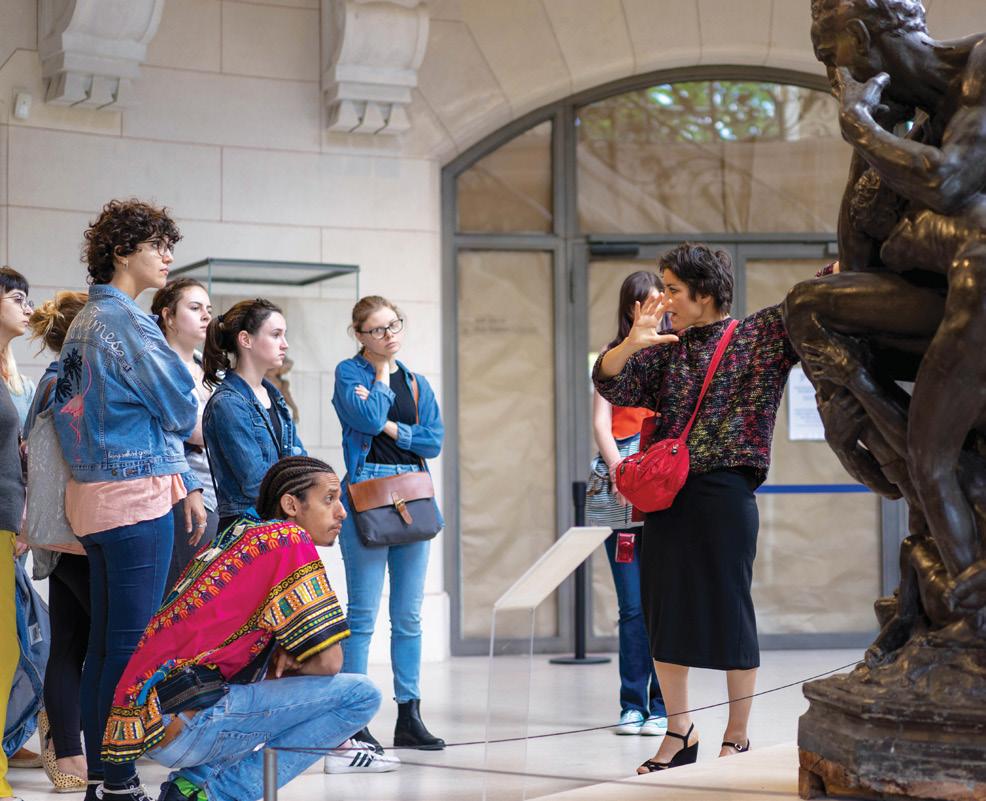
Students taking the Paris Through Its Museums
The liberal arts nourish the development of “soft skills”: those intellectual and social capacities that include critical thinking, the ability to work well with others, communication, adaptability, emotional intelligence and reasoning. Whereas “hard skills” (such as computer literacy or financial management) are often teachable on the job, soft skills make young professionals stand out because they can be very difficult for employers to teach. It’s easy to train a new hire on how to use Photoshop; it’s less straightforward to train them how to think for themselves.
AUP’s approach to the liberal arts produces graduates who possess career-critical soft skills in abundance. As part of our Global Liberal Arts Core Curriculum, students are required to take courses in a variety of subjects – including math, science, French and English – in addition to their chosen major(s). This ensures they have a well-balanced exposure to the humanities, arts, and natural and social sciences. When I spoke to Linda Martz, AUP’s Director of Academic Advising, she said that helping students find the right balance in a personalized program was both a pleasure and a challenge. “There are so many ways to do this through a diverse curricular offering like ours,” she explained.
Inside the classroom, faculty push students to interact critically with course material; students learn to question what they read, analyze academic concepts and develop their own lines of enquiry. At the end of each semester, I enjoy hearing students discuss their assignments. The topic of a term paper is often open-ended: students are encouraged to define their own question. While it is easy to lament this openendedness – “Why can’t Professor so-and-so just give us a question?” – it is incredibly valuable for students to develop the confidence to decide for themselves what to write about. Employers genuinely value our graduates’ ability to think critically and independently without the need for constant direction.
Outside the classroom, students are confronted with a wide variety of experiential learning opportunities that explore what happens when theory becomes practice. Ranging from student government to study trips, these cocurricular initiatives are further opportunities for exploration – and “co-curricular” does not preclude faculty involvement! In Spring 2019, Professor Marie Regan and colleagues organized a two-day masterclass on film production using real materials and budgets. Professor Jonathan Shimony routinely collaborates with fine arts students on the curation of the AUP Fine Arts Gallery. As students move beyond the classroom, they develop self-knowledge that will prove extremely valuable in their future careers.
THE GPS PROGRAM: ENGAGED STUDENTS, SUCCESSFUL GRADUATES
As Director of Experiential Learning, I oversee several of the University’s co-curricular initiatives. It’s a great position because it pulls together so many aspects of what makes AUP unique. This is keenly expressed through the Global Professional Skills (GPS) Program, a four-year undergraduate student-development initiative that provides students with a holistic view of their university experience from the moment they arrive in Paris, helping them view the curricular and co-curricular elements of their studies as two parts of the same journey. It supports students right up until graduation as they prepare to tackle their next steps head on. Upon completion of the program, students receive an official co-curricular record as a companion to their academic transcript – proof of the full range of skills they have fostered during their time at AUP.
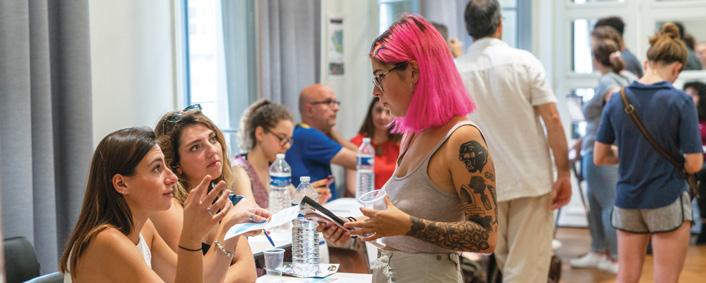
By connecting the dots between their curricular and co-curricular experiences in this way, students can articulate their professional goals and competencies more clearly. Participation in the program entails three main components. Firstly, students complete a series of minimum involvement requirements built around AUP’s four core capabilities: these are categorized under the headings Professional (internships or CV workshops), Personal (athletics, art clubs and wellness activities), Leadership (club management and student government) and Cultural Fluency (study trips, study abroad, language clubs and culture clubs). Secondly, seniors attend a Designing Your Narrative (DYN) workshop during which they think about their post-graduation plans – a job, an internship, graduate school or an entrepreneurial venture – and begin constructing a coherent story that weaves their undergraduate experiences together for a specified audience, such as an employer or a graduate admissions counselor. Thirdly, students submit their narrative for examination, defining a clear objective and presenting themselves accordingly.
For many students the narrative is not at all hypothetical: they are actually applying for the job or graduate program they use as an example. In any case, the objective is to equip students with the tools they need to market themselves effectively. It can be hard for students to know exactly what they want to do in life; through GPS, we want to make sure that, whatever their choice of career, they are equipped to make those choices a reality – and to find a job that gets them excited to head into work every day.

Students get hands-on at Fashion Week
The definition of experiential learning can vary, but in my opinion, it happens when students experiment. For anyone seeking a meaningful career, answering the question “What matters to me?” is an absolute prerequisite. Selfknowledge requires exploration and trial and error. In my experience, experiential learning opportunities are the best sandbox for students to learn about what they enjoy doing and what feels right to them.
INTERNSHIPS: EXPLORE, EXPERIMENT, KNOW YOURSELF
Internships are a great way to accomplish this. AUP students register more than 200 internships a year, making internships one of the most common co-curricular experiences at AUP. I tell students that internships are a great low-risk way to test out possible careers, because they are relatively short, they do not have to count for academic credit and students are not relying on the income from an internship to support themselves. Sure, internships look great on a CV, but more importantly internships are a chance for students to test-drive a job they think they’ll love.
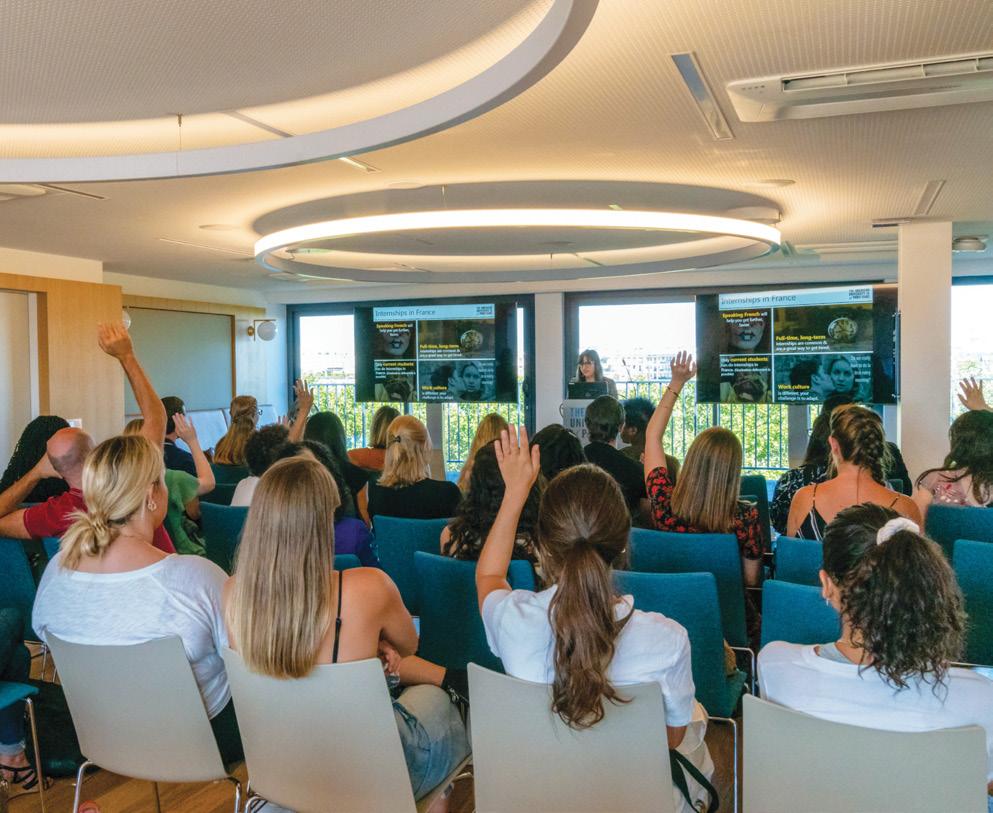
AUP’s InternshipCoordinator, Kortney Nosakowski, speaks to students
Here’s a great example: Paris is one of the fashion capitals of the world, so of course we have a fair number of students who aspire to careers in the fashion industry. AUP has a network of brands that recruit Fashion Week interns twice a year. I encourage every student interested in fashion to apply. Every season, the majority of these interns adore the experience and are keen to move on to a more substantial role. There are, however, always a few who realize the industry isn’t for them. These in situ experiences can drastically changes a person’s perception of a job, of an industry and even of themselves. Even if the experience is, in some ways, negative, it is an enormously valuable insight.
Those of us who work in career advising know that young graduates often struggle with transitioning to the professional sphere. Internships are a fantastic way to ease this transition, and AUP’s co-curricular emphasis sets students up to prosper in these roles. One repeat internship employer I spoke to said she felt that, compared to students from a traditional French university, AUP interns were more flexible, more creative and more independent – all traits she valued highly. This was not an isolated conversation; it’s the sort of thing I hear time and again. It’s why AUP has such a healthy employer network feeding job and internship opportunities to our community year-round.
THE CULTURAL PROGRAM: ALWAYS EXPLORING, ALWAYS LEARNING
The Cultural Program is another fine example of experiential learning in action, providing students with an opportunity to get out of the classroom and explore the world. The focus is on learning by doing; students take part in hands-on scenarios all across the planet. Dozens of study trips are organized every year to destinations as varied as Warsaw in Poland and Accra in Ghana. Students travel with faculty, learning from new cultures and applying academic theory to practical examples out in the field.
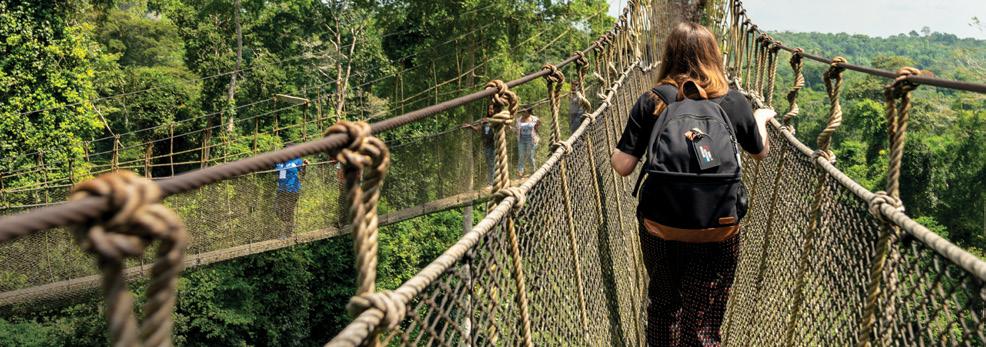
A student crosses a rope bridge on a Cultural Program study trip to Ghana
One amazing example of the impact these study trips can have happened in 2018 on the Sustainable Development Practicum in Auroville, India. Auroville is an experimental township – a hub of innovative social enterprises, known for its emphasis on sustainable living. On the trip, a senior was paired with a nonprofit that had created a search engine, the use of which funded electricity for rural towns in impoverished areas of the country. The student created an animated explainer video to help the company communicate this mission in a concise manner. It wasn’t something she had done before, but she rolled-up her sleeves and, just ten days later, produced a video that the company now uses for all its promotional activities.
CLUBS AND SOCIETIES: CAREER-RELEVANT SELF-KNOWLEDGE
There are also great co-curricular opportunities on campus. The Student Government Association (SGA) is a great way for students to test out and develop their leadership skills. Depending on the role, SGA positions allow students to learn new practical skills. I recently spoke with a student who served for a year as the SGA’s Communications Director. She talked about learning to design promotional materials, running a social media account and event planning. She enjoyed the experience so much that she later opted for an internship in event planning, with the view of choosing it as a career.
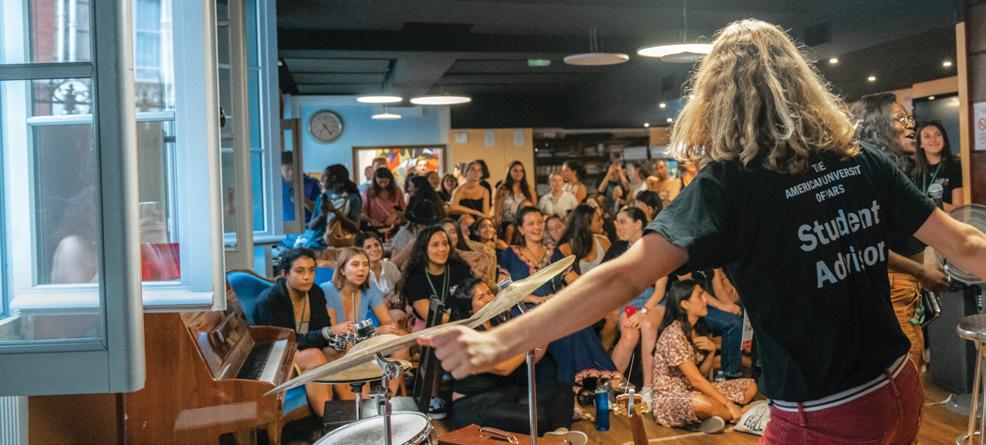
Open mic night at the AMEX Café
Students can also access four competitive athletics teams and a variety of recreational clubs. Marie Anselmi ’19 started the AUP Running Club in her senior year. Marie aspired to join the US Marine Corps, and so physical fitness was a big priority for her. She also thought the club would be a good way to build a community. It was a huge success, not only because it helped Marie improve her fitness, but also because it developed her leadership capacities. Through organizing events and managing club communications, she learned skills that will benefit her in any future career.
Though clubs are largely student-run, AUP encourages faculty to provide relevant expertise in order to increase the potential for student leaders to learn career-critical skills. Professor Hannah Westley from the Department of Global Communications is faculty mentor for AUP Student Media. Students are responsible for a print publication, a website and a YouTube channel. Professor Westley has significant journalistic experience and incorporates professional advice into the co-curricular experience. She told me that learning to write for digital media is useful in an increasingly wide range of careers: “I like to think that ASM workshops give all students the space and the opportunity to work on their skill set for future employment,” she explained.
FINDING MEANING
Together, these co-curricular experiential learning opportunities tell the story of what makes AUP unique. It’s a pleasure for me to help students get involved with so many enriching experiences on a daily basis. Ultimately, it was experiences like these that brought me to Paris and inspired me to pass on my global explorer’s mindset to new generations of students. The evidence that AUP’s approach to a liberal arts education is effective is in our alumni community: the pages of this magazine are chock-full of alumni sharing their inspiring stories. I hope that current and prospective students reading the magazine will be inspired to seek out equally fulfilling work. Because at AUP, that’s what all our efforts are about: helping students find the path to a meaningful career.
